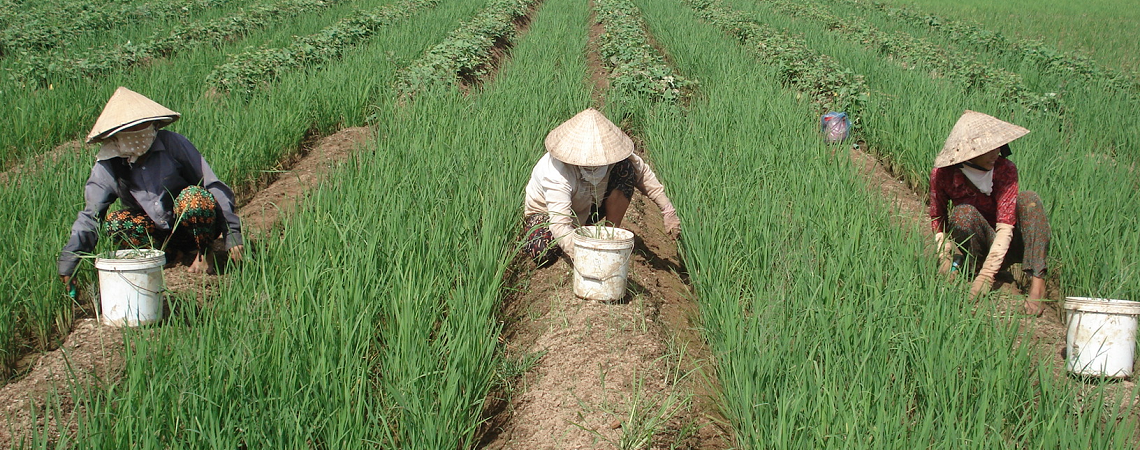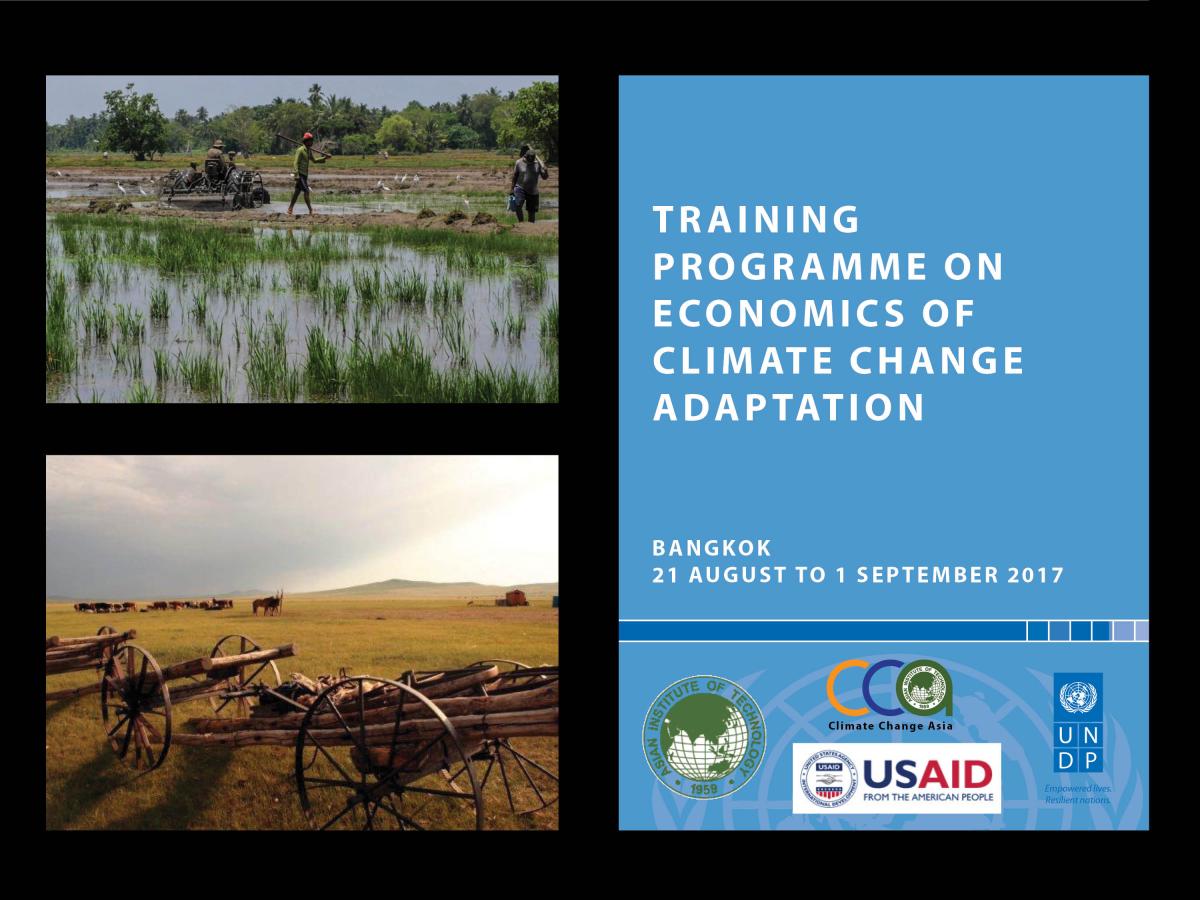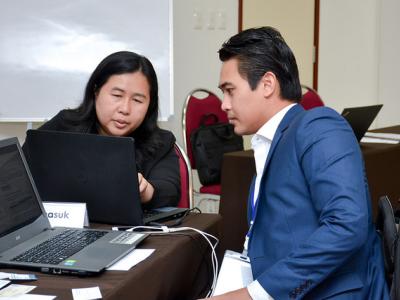
Photo:
Locations:
Bangladesh, Cambodia, Indonesia, Lao PDR, Maldives, Mongolia, Nepal, Philippines, Sri Lanka, Thailand, Viet Nam
The Capacity Building Programme on the Economics of Climate Change Adaptation (ECCA) in Asia was a cooperative effort between UNDP, the USAID ADAPT Asia-Pacific Project, the Asian Development Bank (ADB), the Global Water Partnership (GWP) and Yale University. It addressed a consensus reached during a 2012 Regional Consultation that a more comprehensive approach to mainstreaming climate change risks into planning processes was needed to ensure economically-efficient climate change strategies at the sectoral, sub-national and national levels.
The ECCA programme was comprised of a series of trainings on microeconomic tools for assessing the costs and benefits of adaptation. Trainings were interspersed with in-country work with the mentor support of an economics expert from a local university. The programme targeted technical staff in the public sector, specifically those who are or will be involved in sector or project analysis in central agencies including Planning, Finance, Environment and/or line Ministries. Many of the targeted staff were expected to play key roles in mainstreaming climate into development planning, as Least Developing Countries are shortly expected to do through their respective National Adaptation Plan (NAP) process.
The 1st and 2nd regional workshops provided training on theory and the practical application of cost-benefit analysis, and introduced participants to forecasting and modeling. The 3rd and 4th trainings moved from project level analysis to sectoral analysis, and looked into country-specific institutional development plans, within the context of ongoing and new initiatives. These analyses were presented to policy makers to support decision-making related to the assessment of alternative adaptation options.
- Global
The programme aims to produce a cadre of technical officers in each country who are able to conduct economic analyses of climate change adaptation and to feed those analyses into planning and budgeting processes. The programme will seek to strengthen existing systems of sector level planning and budgeting to incorporate key results from the economics of adaptation so that decisions can be evidence-based.
- United Nations Development Programme (UNDP)
- USAID
- Global Water Partnership
- Asian Development Bank
- Yale University
The programme is designed and rolled out as a complement to UNDP's support to countries on adaptation with financing from the Least Developed Country Fund, Special Climate Change Fund (managed by the Global Environment Facility) and the Adaptation Fund. It is aligned with upcoming UNDP-UNEP-GEF support to countries that are preparing to formulate National Adaptation Plans.
Specifically, the approach adopted in this capacity building programme is based on the following key elements:
- Training of technical officers at the national and sub-national level to estimate the economic costs and benefits of climate change impacts as well as adaptation options
- Support technical officers at the national/sub-national level, including others, to assess the costs and benefits of climate change adaptation options in order to promote learning by doing
- Establishment of the training programme within a suitable center of excellence in the country or region that can provide continuous technical advisory support on the economics of adaptation to countries developing national adaptation plans and investment projects
- Convene policy dialogue forums with Ministries of Planning/Finance and line Ministries at the country and regional level to discuss the economics of adaptation in the context of national and sub-national medium and long-term national development plans and investment projects
- Develop and nurture a virtual community of practice of technical officers working on the economics of adaptation
- Support the appraisal of investment projects for adaptation that can be financed from current and emerging sources of climate finance
Applications open for March 2018 Economics of Climate Change Adaptation programme - November 2018.
'Uniting theory and action: Asia Pacific Economics of Climate Change Adaptation programme relaunches' - UNDP, June 2017. Notice of launch of Phase Two of the ECCA Programme in partnership with the Asian Institute of Technology.
- Technical officers in Planning, Finance, Environment, Agriculture, Water and Public Works Ministries and others at the national and sub-national level trained to estimate the economic costs and benefits of climate change impacts as well as adaptation options
- Country Teams (comprised of technical officers from relevant Government Ministries, academia and others) conduct assessments on the costs and benefits of climate change adaptation options (this work will be linked to ongoing adaptation projects financed by the Least Developed Country Fund, Special Climate Change Fund and/or Adaptation Fund)
- Investment projects for adaptation that can be financed from current and emerging sources of funds such as the Green Climate Fund will be assessed in terms of their economic costs and benefits
- Establishment of the training programme within a suitable learning center in the country or region that can provide continuous technical advisory support to countries on the assessing the economic costs/benefits of adaptation
- Regular policy dialogue forums with Ministries of Planning/Finance and line Ministries conducted at the country and regional level to discuss the economics of adaptation in the context of national and sub-national medium and long-term national development planning process.
- A virtual community of practice working on the economics of adaptation in will be established, with innovative means to share lessons and knowledge, including Live Chats and Webinars- virtual classroom settings where participants discuss issues with the lead mentors as well as each other. The Global ALM platform will avail facilities for the community of practice to share learning materials as well as lessons learned.
Upcoming Trainings
The Economics of Climate Change Adaptation programme was launched by the United Nations Development Programme (UNDP), the United States Agency for International Development (USAID) Adapt Asia-Pacific Project, the Asian Development Bank, the Global Water Partnership and the Yale University in response to the need for a more comprehensive approach for mainstreaming climate change considerations into national planning process to ensure economically-efficient climate change strategies at the sectoral, sub-national and national levels. The programme is comprised of a series of training events aiming to equip government officials in the Asia and the Pacific region with economic tools to help them identify adaptation needs, formulate national adaptation plans and access climate finance for adaptation action. The UNDP in cooperation with the USAID Adapt Asia-Pacific Project and the Regional Resource Center for Asia and the Pacific at the Asian Institute of Technology is organizing ten-day Training Programmes on Economics of Climate Change Adaptation, to be held in August 2017 and February 2018 in Bangkok, Thailand. Learn more and apply
Programme Related Documents and Events
Overall Programme Related Documents
Asia Programme Related Events
Communities of Practice, Live Chat and Webinar
Communities of Practice (CoP) Platform
First Live Chat Session Summary Report - June 2013
Post-Meeting Evaluations
Satisfaction Index of Launch Meeting Bangkok (24-26 Oct 2012)
Satisfaction Index of First Regional Meeting in Bangkok (11-14 March 2013)
- UNDPPradeep KurukulasuriyaHead of Climate Change Adaptation, Global Environmental Finance Unit, Bureau for Policy and Programme Support
- UNDPMari TomovaProject coordinator

